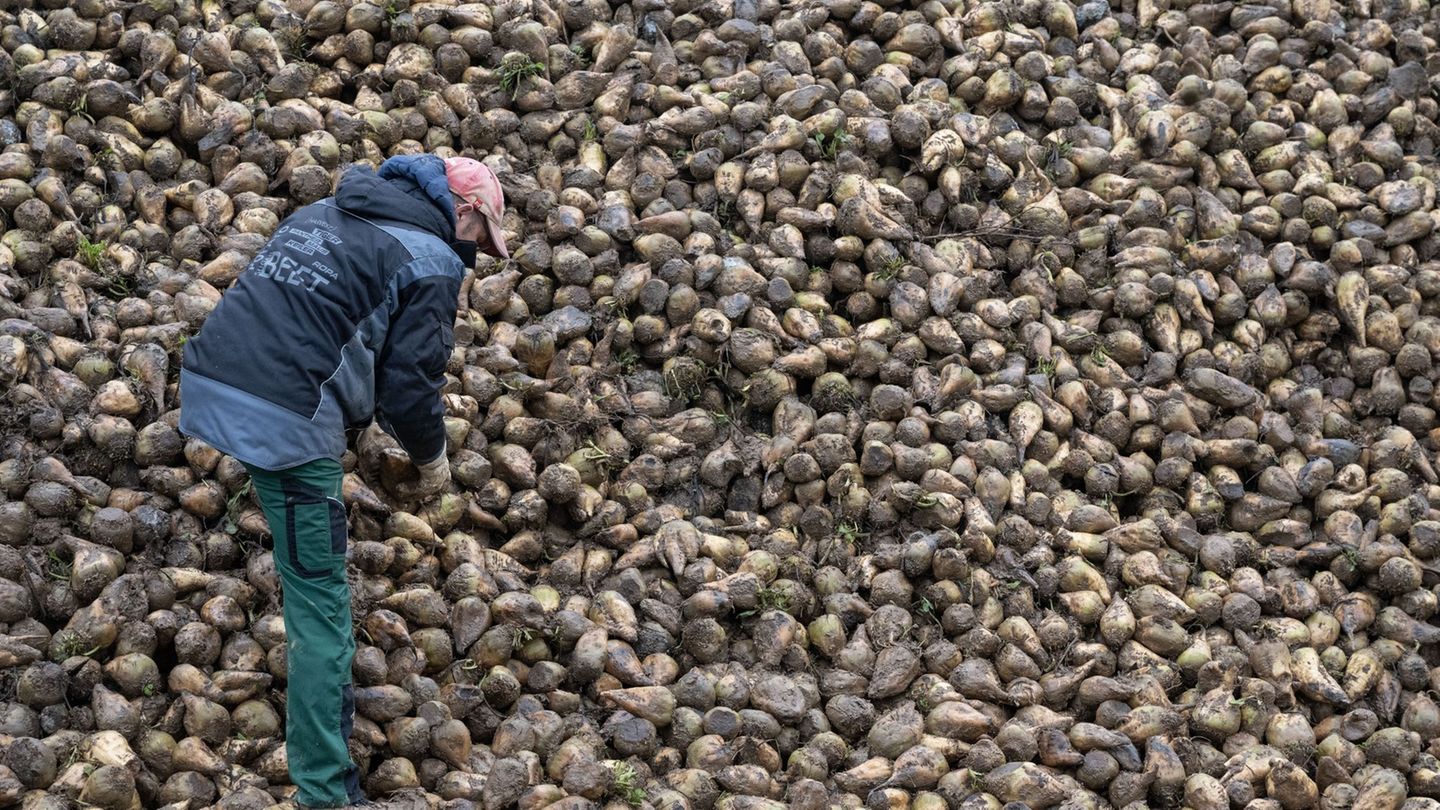agriculture
Like a zikade, pouring beet and potatoes threatened
Copy the current link
Add to the memorial list
Rubber beets and soft potatoes – a small insect increasingly ensures massive losses for sugar beet and potatoes. Other vegetables are also affected. What does that mean for consumers?
First of all, sugar beet, then potatoes, onions, celery, beetroot, cabbage, carrots and partly rhubarb and paprika are now affected: according to the German Farmers’ Association, the plant disease, which is widespread over a type of cicada, threatens agriculture. Especially in southern Germany, it is considered the “serious threat” to supply domestic potatoes, vegetables and sugar, according to the Baden-Württemberg Ministry of Agriculture.
According to the State Farmers’ Association, the damage is “in the millions” in Baden-Württemberg alone. And climate change inspires the spread.
What happens to the vegetables?
The bacterium Candidatus Phytoplasma Solani is transferred to plants by stings of the reed glass-winged culinary cicade, the disease caused is called Stolbur. Infected stocks wither, roots and tubers become rubber -like. The yield drops, taste and quality suffer, for example due to lower sugar content. In the event of severe infestation, sugar beets, potatoes and vegetables cannot be processed and stored.
Stolbur and the infectious disease SBR (syndrome of low sugar content) also transmitted by cicadas ensure high loss of yield and quality. With sugar beet alone, the affected area of 40,000 hectares rose to at least 75,000 hectares last year in 2023. According to the farmers’ association, this corresponds to about a quarter of the German cultivation area.
Is the domestic potato threatened?
Potatoes are among the few foods with which Germany can largely supply itself. According to the Union of German Potato Management (Unika), around 65,000 hectares are currently classified as regions in which reed-glauclass wing cubes can occur and potatoes can be infected. This corresponds to almost a quarter of the entire cultivation area of the basic food in Germany, as association manager SebaStean Schwarz says.
Whether and how the cicada spread depends on various factors, including the weather. In the warmer south, it is already a major problem: Weeke potatoes have been increasingly found since 2024 – for example from Karlsruhe to the Hohenloher level and from Heilbronn via Ludwigsburg to Stuttgart.
Where does the zikade do your mischief?
According to the German Farmers’ Association, the insect has spread from Baden-Württemberg via Rhineland-Palatinate, Bavaria and Hesse in Germany. In the meantime, Lower Saxony, Saxony and Saxony-Anhalt are now affected. According to the state farmers’ association, the southwest is most affected in terms of spread and economic consequences.
According to observation of the Baden-Württemberg Ministry of Agriculture, the pest occurs in particular where growing regions of sugar beet, potatoes and vegetables overlap.
What does that mean for consumers?
According to the associations and authorities, there is no evidence that Stolbur could be harmful to humans. Potatoes and vegetables with rubber -like consistency or when signs of putrefaction are also not available.
If the disease spreads further, consumers could get fewer domestic potatoes in autumn.
What are the consequences for farmers?
The spread of the pest gives the farmers great losses to the total failure. Affected potatoes and vegetables are not removed, plant goods cannot be used. Damage is also caused by increased sorting effort and the necessary disposal.
According to the State Farmers’ Association in Baden-Württemberg alone, there was a loss of earnings of up to 25 percent last year in all relevant beet growing areas, up to 70 percent in potato cultivation. “In some companies, the continuation of the extension is in question,” said a spokeswoman. The disease develops into a serious economic risk for entire regions.
Why is Stolbur so threatening?
Plant disease has been known for sugar beet for a long time. What is new is that, in addition to potatoes, other vegetables are increasingly affected. At the same time, according to the Unika potato association, there is no effective protection against the pest. And the climate favors the spread.
What does the climate have to do with it?
Cicadas feel particularly comfortable in warm early summer and summers and then multiply massively. “The cicadas are favored by climate change,” says the Baden-Württemberg Ministry of Agriculture. Due to the mass occurrence of the cicadas from mid -May to the end of August, further crops in regions could be infected with beet growing.
The Federal Office for Consumer Protection and Food Safety (BVL) can allow the use of an unauthorized crop protection product to be limited by an emergency approval if a pest cannot be combated otherwise. Such special pesticides were permitted against the cicada under strict requirements.
Because emergency registrations, fruit sequence adaptation or soil processing hardly help, farmers demand quick action from politics: “It is imperative that effective means of combating the cicadas can be used,” says chief of farmers’ association Joachim Rukwied. In addition, farmers want research on resistance breeding.
For Stefan Streng, Chairman of the Economic Association of Zucker, the reed-gla-winged cigade is the biggest cropping challenge of the next few years. “We urgently need support here.”
dpa
Source: Stern




